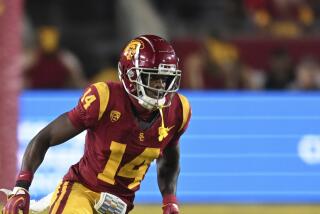Trojans’ Turner Learns a Lesson
- Share via
The kid was smooth enough on the basketball court, and tall enough at 6 feet 8, to fancy himself another Magic Johnson or Scottie Pippen.
“Pushing the ball up the floor,” he said. “Getting creative.”
But those dreams pretty much died the day Jarvis Turner left South Bakersfield for the USC campus.
The Trojans had no big men so Coach Henry Bibby needed Turner to play inside, where the grinding work of defense and rebounding gets done. He needed the freshman to put the team ahead of his dreams.
“I was just so used to the freedom of playing outside,” Turner said. “I thought I was a good player there.”
The coach would hear none of it.
“Jarvis came in with certain ideas,” Bibby said. “He wasn’t as receptive as you’d want a kid to be.”
The battle line was drawn.
When USC opens the season against San Diego State at the Sports Arena tonight, look for No. 21 close to the basket. After two years of butting heads, Turner has accepted his role.
On a team that likes to run, the junior forward may be the closest thing the Trojans have to a half-court offense, posting up, shooting quick hooks and jump shots.
“I love what Jarvis is doing,” Bibby said. “This year he is focused on playing inside. That’s why his game has gotten better.”
And that’s why Turner can smile. He is a generally good-natured young man, the son of a Baptist preacher who has changed since arriving at USC in 1996 as, Bibby recalled, “a high school star who was told how good he was by everybody.”
Their struggle was common to college basketball: Players hit campus with expectations that may or may not coincide with what the coach has in mind. In this case, the clash was immediate.
Bibby asked Turner to redshirt as a freshman. Turner refused. Bibby called him lazy. Turner thought the coach was unreasonable.
“Jarvis never had a coach like Henry, who pushes hard, who yells,” John Turner, his father, said. “When he really got yelled at, it troubled him.”
There were few bright spots early on. As a freshman, Turner had 17 points and eight rebounds against Stanford. He had 18 points and five rebounds in last season’s opener against nationally ranked New Mexico.
But every good game was tempered by dreary nights of few baskets and fewer rebounds. Besides everything else, injuries forced Turner to miss chunks of his freshman and sophomore seasons.
Thoughts of quitting crossed his mind.
“I’m not a jerk or anything like that,” he said. “But Coach and I had our differences. We had our ups and downs.”
Bibby could sympathize. Back in 1968, he was a stubborn high school All-American from North Carolina.
“Jarvis was fighting the battle that I fought when I was in school,” Bibby said. “You’re always going to fight your coaches. You think things should be done your way.”
There would be no backing down on Bibby’s part. He learned about team play from John Wooden and returns to that theme over and over in conversation. Midway through last season, he sat Turner down and spoke with a bluntness that befits his manner.
“If you want to be on the floor, you have to accept your role,” Bibby said. “You’re either on the floor or you’re on the bench.”
He told Turner, “Your time is running out.”
The player who wanted to be Magic Johnson looks more like Larry Johnson these days.
Turner finished the 1997-98 season with strong performances against Arizona and Arizona State, and has continued to play well through two exhibition games, ranking second on the team with averages of 15 points and 4.5 rebounds.
Concerns remain about his avoiding injury and staying out of foul trouble, but he looks more comfortable around the basket, a lean and muscular presence. His coach knows the sacrifice that was required.
“We’re trying to recruit bigger people to take some pressure off our smaller guys who are playing inside,” Bibby said. “Eventually we’re trying to move them back to their natural positions.”
In the meantime, Turner is happy to be playing well and thinks he might have learned a lesson that extends beyond basketball.
“A lot of people misunderstand Coach Bibby as being a good coach but not a good guy,” he said. “I think he’s a great guy. He’s helped me a lot, as far as maturing these last few years.”
Maybe if a young man can handle adversity on court, he can handle adversity in other parts of his life.
“Things won’t always go your way,” Turner said. “You have to adjust and try your best. I’ve learned that.”
More to Read
Go beyond the scoreboard
Get the latest on L.A.'s teams in the daily Sports Report newsletter.
You may occasionally receive promotional content from the Los Angeles Times.







